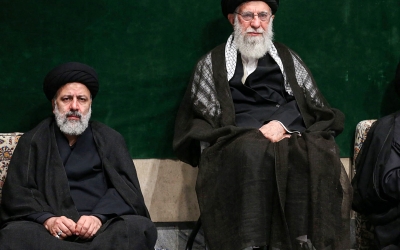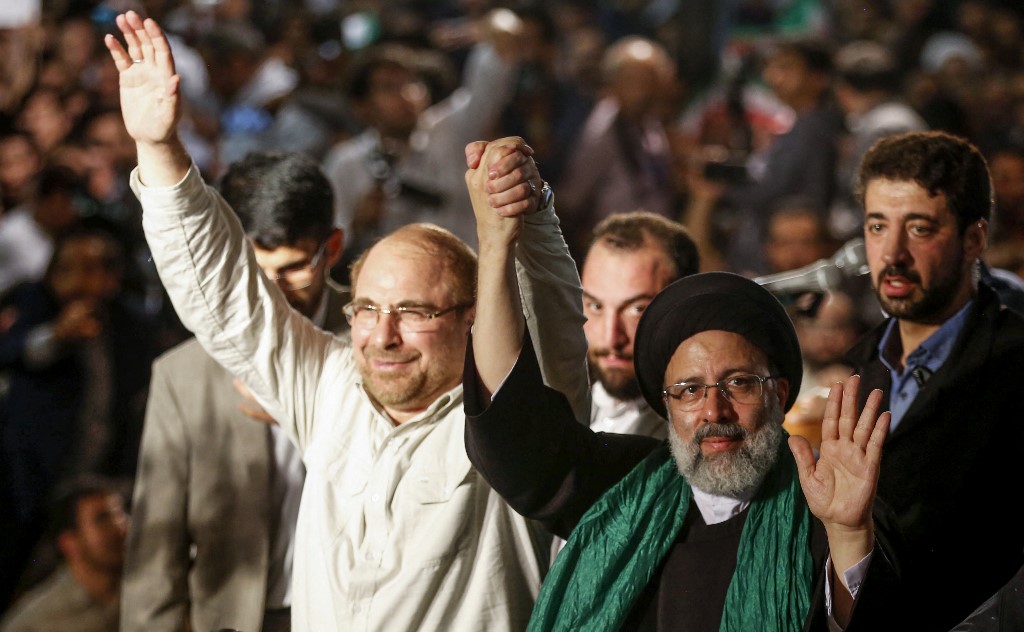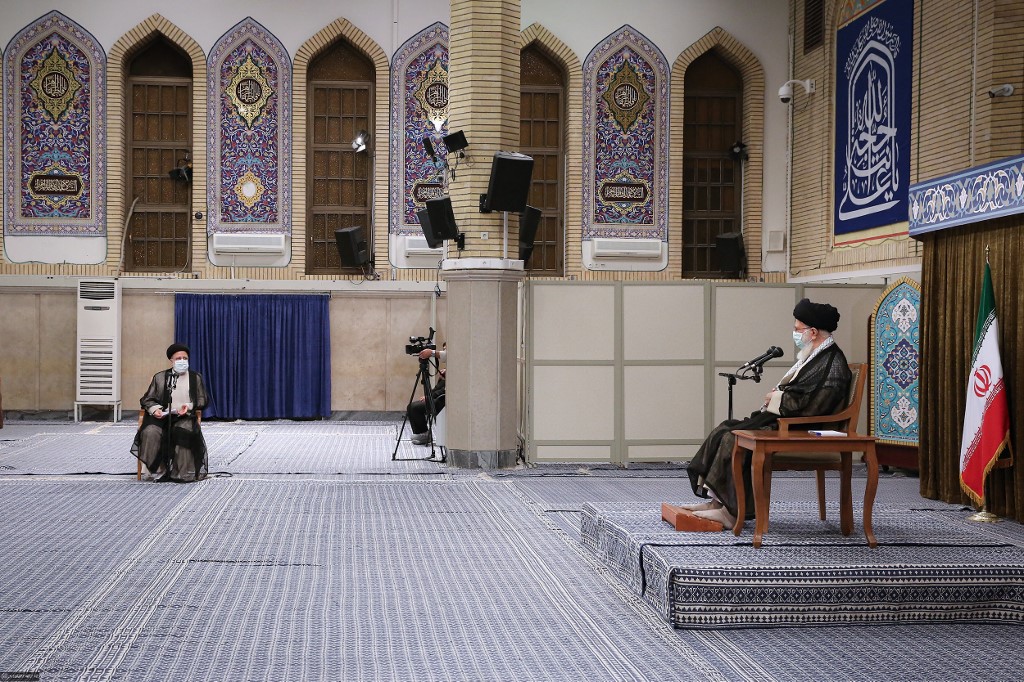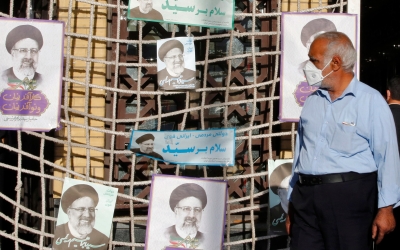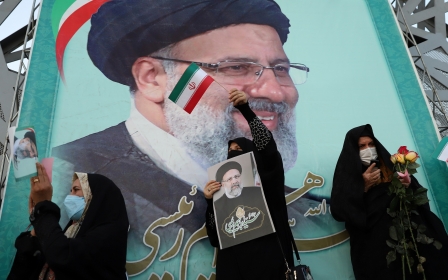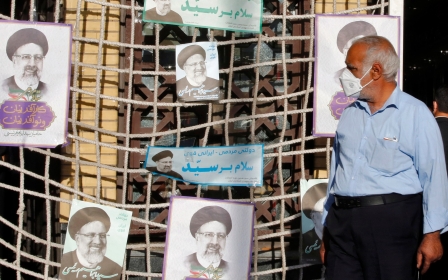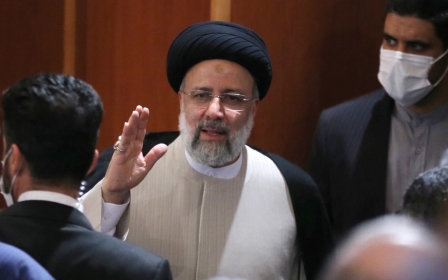Iran: President-elect Raisi set to face divisions among conservatives
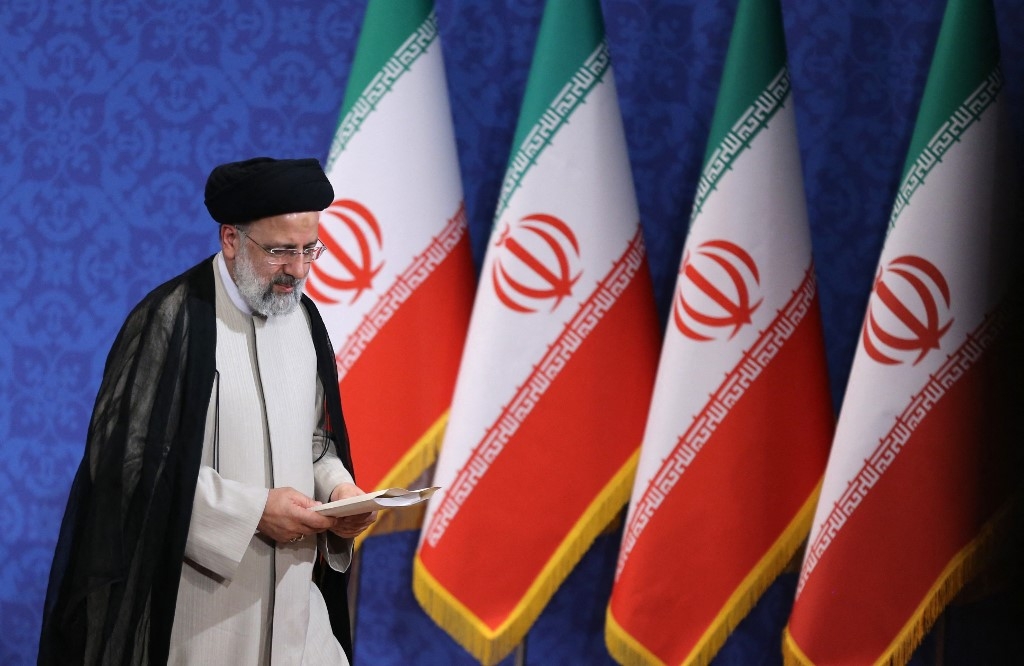
The victory of former chief justice Ebrahim Raisi in Iran’s recent presidential elections may be a prelude to further rifts among his conservative camp, which is now set to control all three branches of power.
Raisi was declared the winner - with 61.95 per cent - of the vote held on 18 June, a largely expected result after many political heavyweights were barred from running.
Voter turnout stood at 48.8 per cent of more than 59 million eligible voters, a record low for a presidential election under the Islamic republic.
Despite the hardliners' political victory, some observers believe that the new political reality will accentuate disagreements in their camp.
The first such conflict is expected to occur between Raisi and conservative parliament speaker Mohammad Bagher Ghalibaf, who was engaged in a hidden war with Raisi before the presidential elections.
New MEE newsletter: Jerusalem Dispatch
Sign up to get the latest insights and analysis on Israel-Palestine, alongside Turkey Unpacked and other MEE newsletters
Less than two months ago, it was not clear who was planning to run for the office of president. Conservatives had been split in two, each group trying to beat the other.
Leaders of the electoral Coalition Council of Islamic Revolution Forces, consisting of prominent hardline politicians, wanted Ghalibaf as the sole candidate of the group, while the Unity Council, a rival conservative electoral camp, wanted to prepare the ground for Raisi, according to Middle East Eye sources.
The two blocs worked hard to reach their goals. But since Raisi had won 16 million votes in the 2017 presidential elections, and his approval ratings during his tenure as the chief justice had risen in recent years, his popularity and acceptance inside the hardline camp were much higher than Ghalibaf's.
Aware of Raisi’s position, Ghalibaf, who was adamant about running, decided to prevent Raisi from nominating himself in the elections. In order to reach this goal, he resorted to a series of actions, including publishing critical reports and rumours.
“Ghalibaf’s team did its best to dissuade Raisi from running, or at least put a huge obstacle in the way of his candidacy," a hardline political activist told MEE, speaking on condition of anonymity.
"For instance, they spread rumours about Raisi disrespecting the supreme leader [Ayatollah Ali Khamenei] through his nomination in the race, after the leader had appointed him to chair the judiciary in 2018,” he added.
“Such moves had the potential to turn some senior hardline politicians away from Raisi, while making him hesitant about whether to run or not.”
With Raisi finally entering the field, Ghalibaf - who knew he didn't stand a chance of winning over the favour of the whole hardliner camp - stayed in his role in parliament, while directing his electoral coalition to swiftly declare its support for Raisi.
However, Ghalibaf and Raisi’s supporters did not agree to run on a joint ticket in the Tehran city council elections, where Ghalibaf’s team won.
With Ghalibaf backers about to officially take over the municipal council in September, the election of a new Tehran mayor will be their first priority.
The pro-Ghalibaf city council will not accept someone close to Raisi becoming the mayor of the capital, the hardline activist told MEE, especially since Ghalibaf lost his chance at running for the position in June. He added, however, that “things may get worse if they don’t reach a deal, since Raisi has more than 200 supporters in parliament who may be able to unseat Ghalibaf”.
The hardline base vs Raisi
In 2015, reformist-backed President Hassan Rouhani signed a deal with the P5+1 group (US, UK, France, Russia, China, and Germany) over limitations on Iran’s nuclear activities in return for sanctions relief.
Since then, hardliners have attacked Rouhani and Foreign Minister Mohammad Javad Zarif, accusing them of negotiating a “weak” agreement, which they have argued constituted “treason” by making Tehran grant many concessions to the US in exchange for very little.
At the time, a remarkable percentage of the conservative base staged protests against signing the deal, known as the Joint Comprehensive Plan of Action (JCPOA), with former nuclear negotiator Saeed Jalili - who stood as a hardline candidate in the June elections - describing it as contrary to national interests. However, in 2018, then-US President Donald Trump exited the deal, leading his successor, Joe Biden, and the outgoing Rouhani administration to start new indirect talks in early 2021 to revive it.
'Raisi himself has no problem with negotiations, even with the US, but such a move would heighten tensions in the conservative camp'
- Former conservative official
During the June presidential debates, Raisi declared his support for the JCPOA, stating that he honoured the governments’ treaties and agreements and that his “strong” administration would be able to make the JCPOA fruitful. His comments, however, triggered the anger of a significant number of his allies, who considered it a departure from the ideology and identity of conservatives.
As a result, supporters and members of Jalili's entourage began criticising Raisi publicly. Jalili, who later withdrew in favour of Raisi, has many loyal supporters among the new generation of hardliners and the conservative base.
“I think Raisi himself has no problem with negotiations, even with the US, but such a move would heighten tensions in the conservative camp, and even within his own administration,” a former conservative official told MEE.
The official added: “If Rouhani doesn’t succeed in reviving the JCPOA, Raisi’s possible measure to resume talks with the US over the deal would deliver an ideological blow to his base and the whole hardline camp, as they have been always against the deal and any engagement with the US.”
'Harmful' remarks
In a rare move, a senior deputy in the supreme leader's office, Vahid Haghanian, published an article after Raisi's electoral victory indirectly acknowledging that hardliners had cleared the way for his win by barring prominent moderate and reformist candidates from running for office.
The comments were unprecedented for Haghanian, a behind-the-curtains official who had not spoken publicly, let alone written an article on elections for a reformist news outlet.
Hardline Tasnim news agency, which is close to the Islamic Revolutionary Guard Corps (IRGC), responded by slamming Haghanian for his “harmful” remarks, urging him to stay quiet as long as he holds a position in Khamenei's office.
Haghanian seems to have intentionally agreed with remarks by opposition leaders and reformists, who have called the presidential race an unfair “electoral coup” against the pro-reform current.
His revealing comments may have been aimed at disrupting the plans of those backing Raisi, while illustrating divisions inside the conservative camp, even at the higher echelons of the hardline-dominated establishment of the Islamic republic - discord that may only amplify in the future.
In August, Rouhani’s second term will come to an end, and Raisi will take his place in the presidential palace. Once Raisi takes office, disagreements may arise - albeit not publicly - as he seeks to form a cabinet and appoint ministers from within the divided hardline camp.
Meanwhile, an Iranian source told MEE that there were also divisions within Raisi’s inner circle, a critical issue that may intensify in the near future as members of his team attempt to gain more power.
According to an Iranian source, Raisi did not enjoy a good relationship with his first deputy, Gholam Hossein Mohseni Ejei, during his tenure as chief justice, as the latter was imposed on him by Khamenei’s office. Raisi sought to decrease Ejei’s power in the role.
Now, with Ejei rumoured to replace Raisi as chief justice, their old disagreements may lead to renewed hostility between the two, especially since the chief justice, along with the parliament speaker, are members of a three-member council chaired by the president and tasked with making final decisions on major economic issues.
As one of the major branches of power in Iran, the judiciary also has enough authority to place obstacles in the way of presidential orders and put pressure on the president.
This article is available in French on Middle East Eye French edition.
Middle East Eye delivers independent and unrivalled coverage and analysis of the Middle East, North Africa and beyond. To learn more about republishing this content and the associated fees, please fill out this form. More about MEE can be found here.


